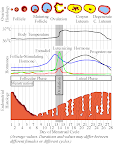Ultimately, any decision on birth control should not be made on the fly
I first heard of the pill from a new blog I'm following: Nature's Spoonful of Medicine.At the time, I thought it a curious concept, but nothing too serious. After all, the pill women take now in effect does away with true menstruation anyway, since there is no ovulation. As Spoonful says,
This fake period was designed into the pill when it was first introduced in 1960 so as not to freak women out too much.Later, Eugene Volokh posted his take on it at his blog, The Volokh Conspiracy. He felt it was
perfectly sensible to be concerned about the pill's safety, ... But [he didn't] see any justification for the feeling that it's not "right to sidestep" something that's "part of being a woman."It was the second assertion where I disagreed with him. I left a comment, and that was that.
Today I noticed that he posted about it again, but this time QUOTED ME. I must say, I was quite flattered, even if he agreed with me in part. I respect his opinions and intelligence greatly (part of why I read his blog). So I have commented again.
I feel that this discussion lends itself easily to tangents that confuse and distract. From a medical standpoint we must not forget that no contraceptive pill is perfect. Pills come in two general classes: estrogen + progesterone pills and progesterone-only pills.
The standard menstrual cycle is roughly 28 days. The follicular phase lasts 12-14 days, ovulation is 1 day, and the luteal phase is 12-14 days. Normally, a woman's anterior pituitary in your brain secretes two hormones, FSH and LH, into her bloodstream. The amount of these hormones in the blood cycles throughout the day. At ovulation, a surge in Estradiol (an estrogen) sparks a surge in FSH and LH and a release of an egg from the ovary. Progesterone functions to maintain pregnancy by decreasing fluid secretion and motility of the uterus. Without fertilization, progesterone levels drop, and the body sloughs off the bloody lining of the uterus with the unfertilized egg during menses.
Estrogen + progesterone pills block ovulation by "tricking" the woman's body into believing it doesn't need to secrete an egg. Then, a placebo week drops progesterone levels and the woman's uterus sheds the blood-filled lining.
They have two types: monophasic and multiphasic. Monophasic pills have a fixed dose of hormones that the woman receives daily. Multiphasic pills have varying dosage of hormones throughout the month and lower total steroid levels.
Today I noticed that he posted about it again, but this time QUOTED ME
Progesterone only pills have an increased risk of endometrial breakthrough (i.e. cancer), but are a good option for nursing mothers because estrogen messes with lactation. They also have a higher failure rate because technically progesterone doesn't prevent ovulation, it just makes it near impossible to be fertilized and implanted in the uterus. Lybrel, the new pill that eliminates periods, is an estrogen + progesterone pill, and therefore blocks ovulation. However, it's not the magical bullet people think it is. The FDA says,
Women who use Lybrel would not have a scheduled menstrual period, but will most likely have unplanned, breakthrough, unscheduled bleeding or spotting.Seasonale, a pill that came out in 2003 and limits menstruation to four times a year also has spotting.
...The risks of using Lybrel are similar to the risks of other conventional oral contraceptives and include an increased risk of blood clots, heart attacks, and strokes.
"It was really inconvenient, which kind of defeats the purpose," grumbles Pierrette Lo, 27, of Houston, who tried Seasonale last year but gave up after a few months.For those women who don't have horrible cramping during their periods, they might be better off with the regular pills, because at least then a woman knows when she will bleed. Lybrel's real benefit comes not in giving every woman who doesn't want a period an out, but in helping those women who really have bad cramps and other symptoms. Those women can opt to give up the five days of torture for unscheduled bleeding and spotting.
Ultimately, any decision on birth control should not be made on the fly. All options should be discussed with a doctor, so a woman can best decide what type of pill will do the job effectively without causing undue physiological changes/problems. She will also be able to decide if the lifestyle changes that taking the pill entails is truly what she wants. For a patient's emotional well-being should be just as important to the modern physician as her physical well-being.
[+/-] read/hide the rest of this post



No comments:
Post a Comment